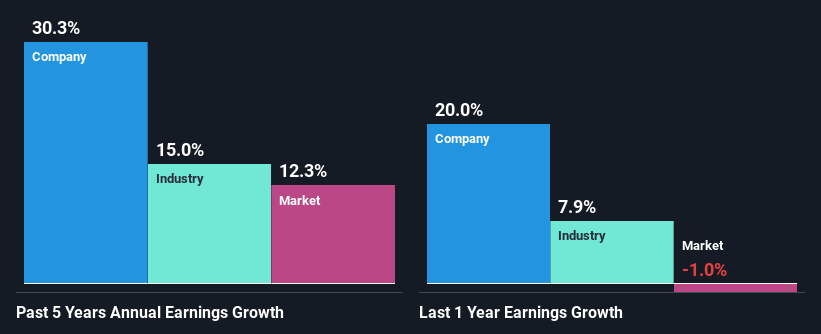Is Krones AG's (ETR:KRN) Recent Performance Tethered To Its Attractive Financial Prospects?
Most readers would already know that Krones' (ETR:KRN) stock increased by 7.9% over the past three months. Given its impressive performance, we decided to study the company's key financial indicators as a company's long-term fundamentals usually dictate market outcomes. Particularly, we will be paying attention to Krones' ROE today.
Return on Equity or ROE is a test of how effectively a company is growing its value and managing investors’ money. In other words, it is a profitability ratio which measures the rate of return on the capital provided by the company's shareholders.
Check out our latest analysis for Krones
How Is ROE Calculated?
Return on equity can be calculated by using the formula:
Return on Equity = Net Profit (from continuing operations) ÷ Shareholders' Equity
So, based on the above formula, the ROE for Krones is:
13% = €225m ÷ €1.7b (Based on the trailing twelve months to December 2023).
The 'return' refers to a company's earnings over the last year. That means that for every €1 worth of shareholders' equity, the company generated €0.13 in profit.
What Is The Relationship Between ROE And Earnings Growth?
Thus far, we have learned that ROE measures how efficiently a company is generating its profits. Based on how much of its profits the company chooses to reinvest or "retain", we are then able to evaluate a company's future ability to generate profits. Assuming everything else remains unchanged, the higher the ROE and profit retention, the higher the growth rate of a company compared to companies that don't necessarily bear these characteristics.
Krones' Earnings Growth And 13% ROE
At first glance, Krones seems to have a decent ROE. Further, the company's ROE is similar to the industry average of 11%. This probably goes some way in explaining Krones' significant 30% net income growth over the past five years amongst other factors. We reckon that there could also be other factors at play here. For instance, the company has a low payout ratio or is being managed efficiently.
As a next step, we compared Krones' net income growth with the industry, and pleasingly, we found that the growth seen by the company is higher than the average industry growth of 15%.
The basis for attaching value to a company is, to a great extent, tied to its earnings growth. What investors need to determine next is if the expected earnings growth, or the lack of it, is already built into the share price. Doing so will help them establish if the stock's future looks promising or ominous. If you're wondering about Krones''s valuation, check out this gauge of its price-to-earnings ratio, as compared to its industry.
Is Krones Efficiently Re-investing Its Profits?
Krones' ' three-year median payout ratio is on the lower side at 25% implying that it is retaining a higher percentage (75%) of its profits. So it looks like Krones is reinvesting profits heavily to grow its business, which shows in its earnings growth.
Besides, Krones has been paying dividends for at least ten years or more. This shows that the company is committed to sharing profits with its shareholders. Our latest analyst data shows that the future payout ratio of the company over the next three years is expected to be approximately 27%. As a result, Krones' ROE is not expected to change by much either, which we inferred from the analyst estimate of 16% for future ROE.
Summary
Overall, we are quite pleased with Krones' performance. Particularly, we like that the company is reinvesting heavily into its business, and at a high rate of return. Unsurprisingly, this has led to an impressive earnings growth. Having said that, the company's earnings growth is expected to slow down, as forecasted in the current analyst estimates. To know more about the latest analysts predictions for the company, check out this visualization of analyst forecasts for the company.
Have feedback on this article? Concerned about the content? Get in touch with us directly. Alternatively, email editorial-team (at) simplywallst.com.
This article by Simply Wall St is general in nature. We provide commentary based on historical data and analyst forecasts only using an unbiased methodology and our articles are not intended to be financial advice. It does not constitute a recommendation to buy or sell any stock, and does not take account of your objectives, or your financial situation. We aim to bring you long-term focused analysis driven by fundamental data. Note that our analysis may not factor in the latest price-sensitive company announcements or qualitative material. Simply Wall St has no position in any stocks mentioned.

